Analysis of Corruption, Anti-Corruption Strategies in Sudan
VerifiedAdded on 2023/01/05
|10
|3946
|29
Report
AI Summary
This report provides a comprehensive analysis of corruption in Sudan, examining its perceived level, impact on anti-corruption behavior, and the development of anti-corruption strategies. It explores the country's previous experiences in combating corruption, investigates the common drivers of corruption, and assesses the political, social, and economic factors that contribute to it. The report also aims to identify ways to promote integrity, ethical practices, and sustainable development. It reviews relevant literature on corruption and nation branding, highlighting the adverse effects of corruption on socioeconomic development, resource management, and the country's image. The research questions focus on the perceived level of corruption, its impact on anti-corruption behavior, the development of anti-corruption measures, previous experiences in fighting corruption, and recommendations for improving the business environment and achieving sustainable development. The literature review covers topics such as nation branding, corruption's impact on economic and social life, multinational enterprises, and foreign direct investments. The report also addresses the significance of ethical practices, legal frameworks, and institutional reforms in curbing corruption and promoting good governance.
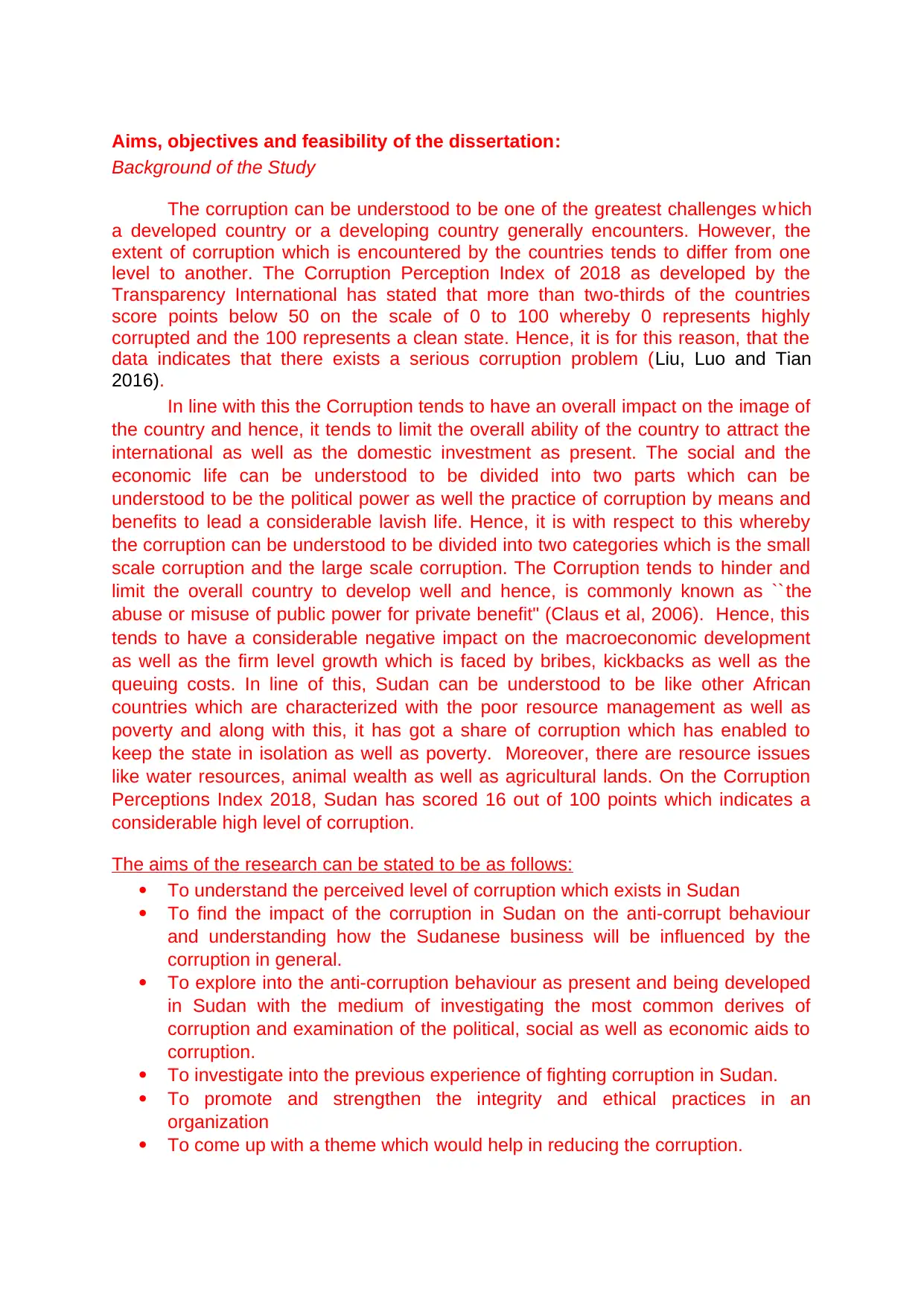
Aims, objectives and feasibility of the dissertation:
Background of the Study
The corruption can be understood to be one of the greatest challenges w hich
a developed country or a developing country generally encounters. However, the
extent of corruption which is encountered by the countries tends to differ from one
level to another. The Corruption Perception Index of 2018 as developed by the
Transparency International has stated that more than two-thirds of the countries
score points below 50 on the scale of 0 to 100 whereby 0 represents highly
corrupted and the 100 represents a clean state. Hence, it is for this reason, that the
data indicates that there exists a serious corruption problem (Liu, Luo and Tian
2016).
In line with this the Corruption tends to have an overall impact on the image of
the country and hence, it tends to limit the overall ability of the country to attract the
international as well as the domestic investment as present. The social and the
economic life can be understood to be divided into two parts which can be
understood to be the political power as well the practice of corruption by means and
benefits to lead a considerable lavish life. Hence, it is with respect to this whereby
the corruption can be understood to be divided into two categories which is the small
scale corruption and the large scale corruption. The Corruption tends to hinder and
limit the overall country to develop well and hence, is commonly known as ``the
abuse or misuse of public power for private benefit" (Claus et al, 2006). Hence, this
tends to have a considerable negative impact on the macroeconomic development
as well as the firm level growth which is faced by bribes, kickbacks as well as the
queuing costs. In line of this, Sudan can be understood to be like other African
countries which are characterized with the poor resource management as well as
poverty and along with this, it has got a share of corruption which has enabled to
keep the state in isolation as well as poverty. Moreover, there are resource issues
like water resources, animal wealth as well as agricultural lands. On the Corruption
Perceptions Index 2018, Sudan has scored 16 out of 100 points which indicates a
considerable high level of corruption.
The aims of the research can be stated to be as follows:
To understand the perceived level of corruption which exists in Sudan
To find the impact of the corruption in Sudan on the anti-corrupt behaviour
and understanding how the Sudanese business will be influenced by the
corruption in general.
To explore into the anti-corruption behaviour as present and being developed
in Sudan with the medium of investigating the most common derives of
corruption and examination of the political, social as well as economic aids to
corruption.
To investigate into the previous experience of fighting corruption in Sudan.
To promote and strengthen the integrity and ethical practices in an
organization
To come up with a theme which would help in reducing the corruption.
Background of the Study
The corruption can be understood to be one of the greatest challenges w hich
a developed country or a developing country generally encounters. However, the
extent of corruption which is encountered by the countries tends to differ from one
level to another. The Corruption Perception Index of 2018 as developed by the
Transparency International has stated that more than two-thirds of the countries
score points below 50 on the scale of 0 to 100 whereby 0 represents highly
corrupted and the 100 represents a clean state. Hence, it is for this reason, that the
data indicates that there exists a serious corruption problem (Liu, Luo and Tian
2016).
In line with this the Corruption tends to have an overall impact on the image of
the country and hence, it tends to limit the overall ability of the country to attract the
international as well as the domestic investment as present. The social and the
economic life can be understood to be divided into two parts which can be
understood to be the political power as well the practice of corruption by means and
benefits to lead a considerable lavish life. Hence, it is with respect to this whereby
the corruption can be understood to be divided into two categories which is the small
scale corruption and the large scale corruption. The Corruption tends to hinder and
limit the overall country to develop well and hence, is commonly known as ``the
abuse or misuse of public power for private benefit" (Claus et al, 2006). Hence, this
tends to have a considerable negative impact on the macroeconomic development
as well as the firm level growth which is faced by bribes, kickbacks as well as the
queuing costs. In line of this, Sudan can be understood to be like other African
countries which are characterized with the poor resource management as well as
poverty and along with this, it has got a share of corruption which has enabled to
keep the state in isolation as well as poverty. Moreover, there are resource issues
like water resources, animal wealth as well as agricultural lands. On the Corruption
Perceptions Index 2018, Sudan has scored 16 out of 100 points which indicates a
considerable high level of corruption.
The aims of the research can be stated to be as follows:
To understand the perceived level of corruption which exists in Sudan
To find the impact of the corruption in Sudan on the anti-corrupt behaviour
and understanding how the Sudanese business will be influenced by the
corruption in general.
To explore into the anti-corruption behaviour as present and being developed
in Sudan with the medium of investigating the most common derives of
corruption and examination of the political, social as well as economic aids to
corruption.
To investigate into the previous experience of fighting corruption in Sudan.
To promote and strengthen the integrity and ethical practices in an
organization
To come up with a theme which would help in reducing the corruption.
Paraphrase This Document
Need a fresh take? Get an instant paraphrase of this document with our AI Paraphraser
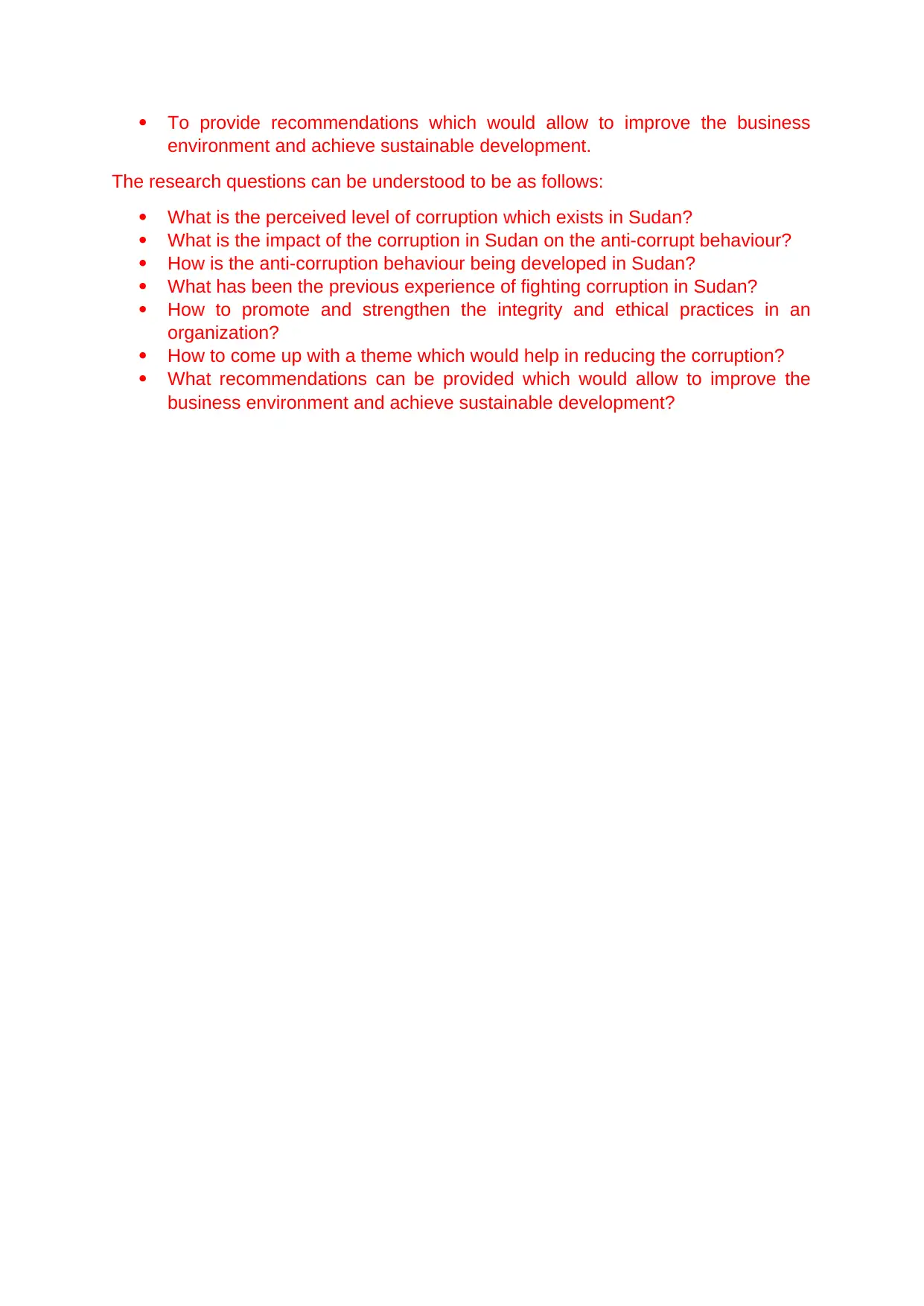
To provide recommendations which would allow to improve the business
environment and achieve sustainable development.
The research questions can be understood to be as follows:
What is the perceived level of corruption which exists in Sudan?
What is the impact of the corruption in Sudan on the anti-corrupt behaviour?
How is the anti-corruption behaviour being developed in Sudan?
What has been the previous experience of fighting corruption in Sudan?
How to promote and strengthen the integrity and ethical practices in an
organization?
How to come up with a theme which would help in reducing the corruption?
What recommendations can be provided which would allow to improve the
business environment and achieve sustainable development?
environment and achieve sustainable development.
The research questions can be understood to be as follows:
What is the perceived level of corruption which exists in Sudan?
What is the impact of the corruption in Sudan on the anti-corrupt behaviour?
How is the anti-corruption behaviour being developed in Sudan?
What has been the previous experience of fighting corruption in Sudan?
How to promote and strengthen the integrity and ethical practices in an
organization?
How to come up with a theme which would help in reducing the corruption?
What recommendations can be provided which would allow to improve the
business environment and achieve sustainable development?
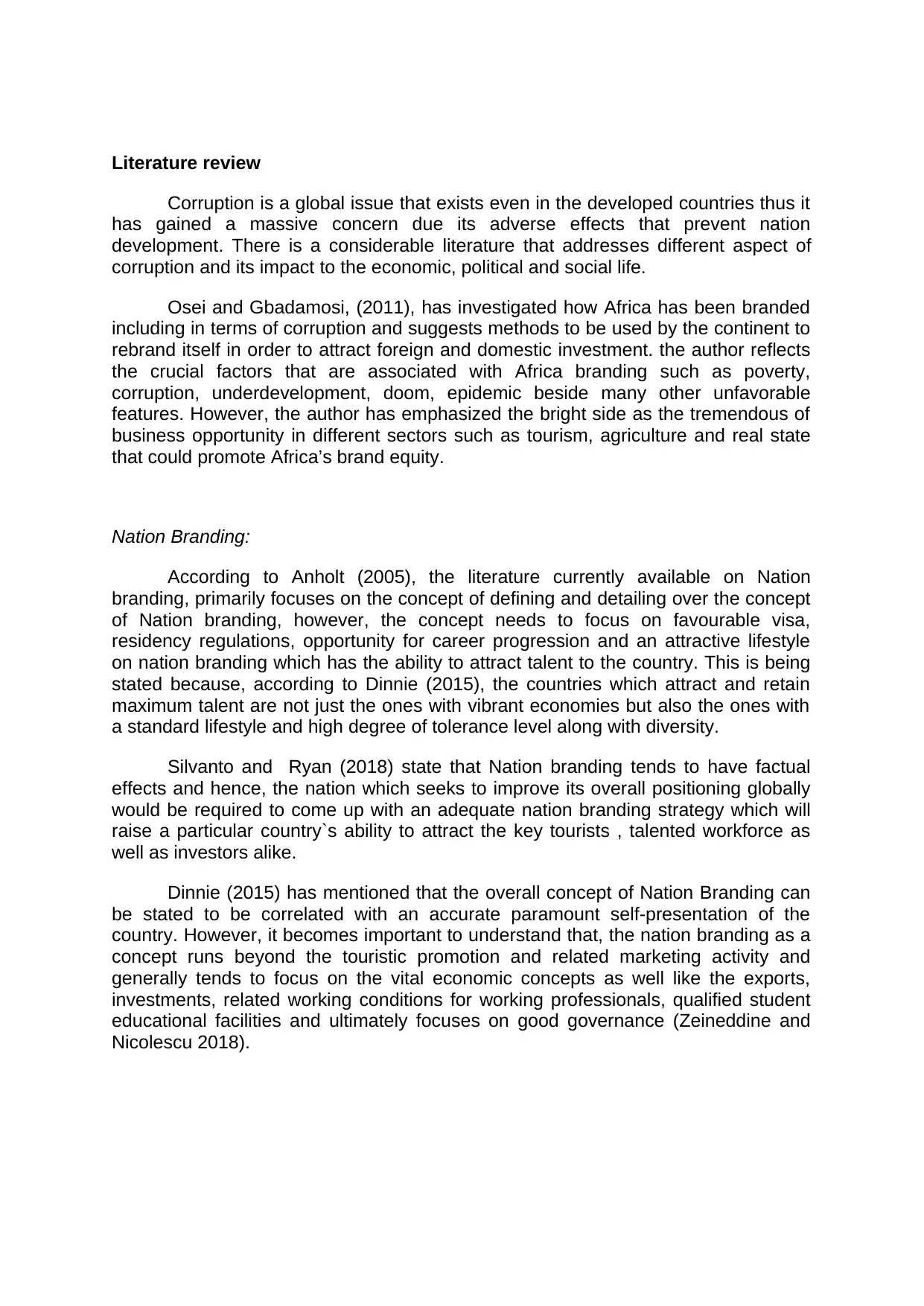
Literature review
Corruption is a global issue that exists even in the developed countries thus it
has gained a massive concern due its adverse effects that prevent nation
development. There is a considerable literature that addresses different aspect of
corruption and its impact to the economic, political and social life.
Osei and Gbadamosi, (2011), has investigated how Africa has been branded
including in terms of corruption and suggests methods to be used by the continent to
rebrand itself in order to attract foreign and domestic investment. the author reflects
the crucial factors that are associated with Africa branding such as poverty,
corruption, underdevelopment, doom, epidemic beside many other unfavorable
features. However, the author has emphasized the bright side as the tremendous of
business opportunity in different sectors such as tourism, agriculture and real state
that could promote Africa’s brand equity.
Nation Branding:
According to Anholt (2005), the literature currently available on Nation
branding, primarily focuses on the concept of defining and detailing over the concept
of Nation branding, however, the concept needs to focus on favourable visa,
residency regulations, opportunity for career progression and an attractive lifestyle
on nation branding which has the ability to attract talent to the country. This is being
stated because, according to Dinnie (2015), the countries which attract and retain
maximum talent are not just the ones with vibrant economies but also the ones with
a standard lifestyle and high degree of tolerance level along with diversity.
Silvanto and Ryan (2018) state that Nation branding tends to have factual
effects and hence, the nation which seeks to improve its overall positioning globally
would be required to come up with an adequate nation branding strategy which will
raise a particular country`s ability to attract the key tourists , talented workforce as
well as investors alike.
Dinnie (2015) has mentioned that the overall concept of Nation Branding can
be stated to be correlated with an accurate paramount self-presentation of the
country. However, it becomes important to understand that, the nation branding as a
concept runs beyond the touristic promotion and related marketing activity and
generally tends to focus on the vital economic concepts as well like the exports,
investments, related working conditions for working professionals, qualified student
educational facilities and ultimately focuses on good governance (Zeineddine and
Nicolescu 2018).
Corruption is a global issue that exists even in the developed countries thus it
has gained a massive concern due its adverse effects that prevent nation
development. There is a considerable literature that addresses different aspect of
corruption and its impact to the economic, political and social life.
Osei and Gbadamosi, (2011), has investigated how Africa has been branded
including in terms of corruption and suggests methods to be used by the continent to
rebrand itself in order to attract foreign and domestic investment. the author reflects
the crucial factors that are associated with Africa branding such as poverty,
corruption, underdevelopment, doom, epidemic beside many other unfavorable
features. However, the author has emphasized the bright side as the tremendous of
business opportunity in different sectors such as tourism, agriculture and real state
that could promote Africa’s brand equity.
Nation Branding:
According to Anholt (2005), the literature currently available on Nation
branding, primarily focuses on the concept of defining and detailing over the concept
of Nation branding, however, the concept needs to focus on favourable visa,
residency regulations, opportunity for career progression and an attractive lifestyle
on nation branding which has the ability to attract talent to the country. This is being
stated because, according to Dinnie (2015), the countries which attract and retain
maximum talent are not just the ones with vibrant economies but also the ones with
a standard lifestyle and high degree of tolerance level along with diversity.
Silvanto and Ryan (2018) state that Nation branding tends to have factual
effects and hence, the nation which seeks to improve its overall positioning globally
would be required to come up with an adequate nation branding strategy which will
raise a particular country`s ability to attract the key tourists , talented workforce as
well as investors alike.
Dinnie (2015) has mentioned that the overall concept of Nation Branding can
be stated to be correlated with an accurate paramount self-presentation of the
country. However, it becomes important to understand that, the nation branding as a
concept runs beyond the touristic promotion and related marketing activity and
generally tends to focus on the vital economic concepts as well like the exports,
investments, related working conditions for working professionals, qualified student
educational facilities and ultimately focuses on good governance (Zeineddine and
Nicolescu 2018).
⊘ This is a preview!⊘
Do you want full access?
Subscribe today to unlock all pages.

Trusted by 1+ million students worldwide
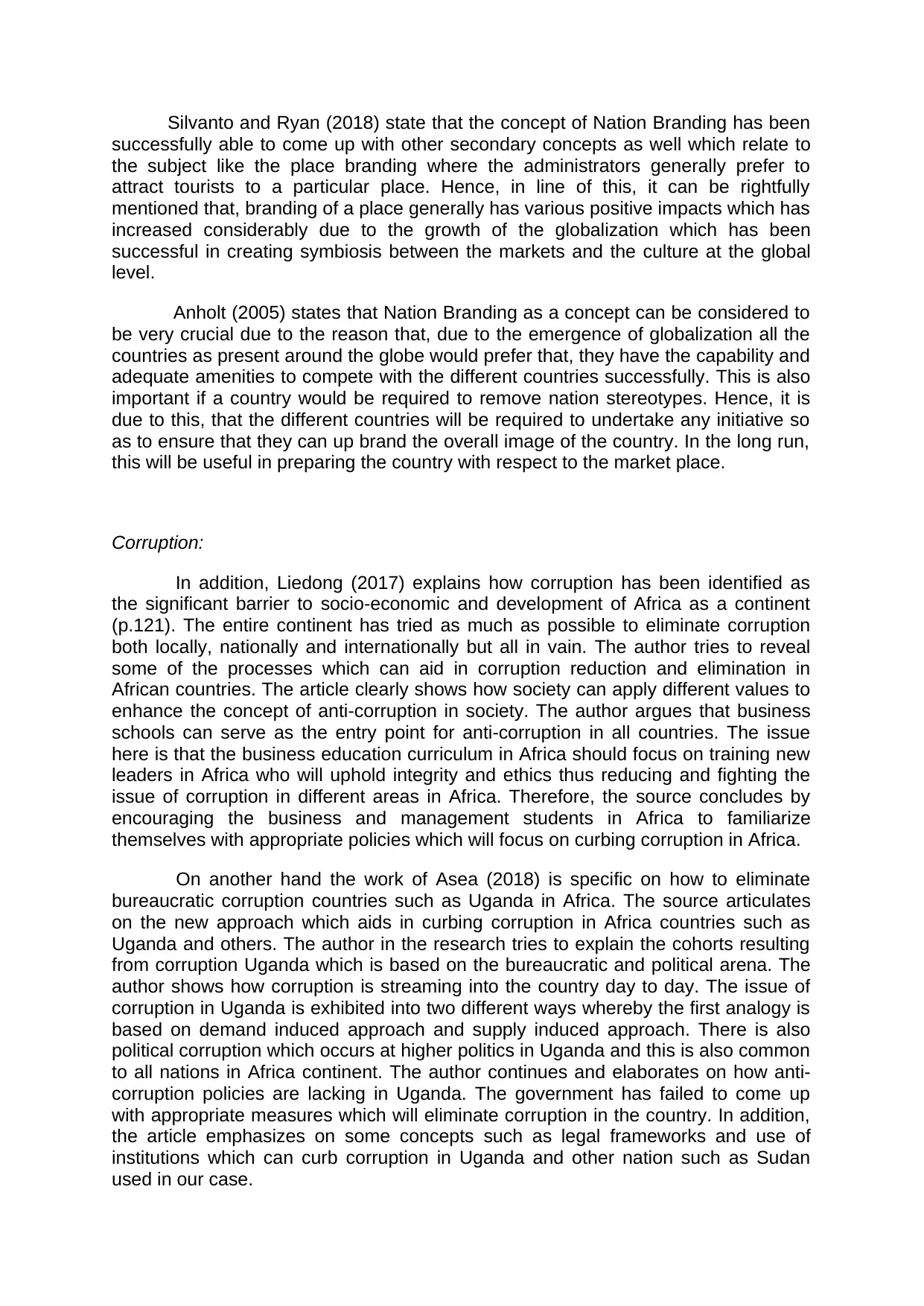
Silvanto and Ryan (2018) state that the concept of Nation Branding has been
successfully able to come up with other secondary concepts as well which relate to
the subject like the place branding where the administrators generally prefer to
attract tourists to a particular place. Hence, in line of this, it can be rightfully
mentioned that, branding of a place generally has various positive impacts which has
increased considerably due to the growth of the globalization which has been
successful in creating symbiosis between the markets and the culture at the global
level.
Anholt (2005) states that Nation Branding as a concept can be considered to
be very crucial due to the reason that, due to the emergence of globalization all the
countries as present around the globe would prefer that, they have the capability and
adequate amenities to compete with the different countries successfully. This is also
important if a country would be required to remove nation stereotypes. Hence, it is
due to this, that the different countries will be required to undertake any initiative so
as to ensure that they can up brand the overall image of the country. In the long run,
this will be useful in preparing the country with respect to the market place.
Corruption:
In addition, Liedong (2017) explains how corruption has been identified as
the significant barrier to socio-economic and development of Africa as a continent
(p.121). The entire continent has tried as much as possible to eliminate corruption
both locally, nationally and internationally but all in vain. The author tries to reveal
some of the processes which can aid in corruption reduction and elimination in
African countries. The article clearly shows how society can apply different values to
enhance the concept of anti-corruption in society. The author argues that business
schools can serve as the entry point for anti-corruption in all countries. The issue
here is that the business education curriculum in Africa should focus on training new
leaders in Africa who will uphold integrity and ethics thus reducing and fighting the
issue of corruption in different areas in Africa. Therefore, the source concludes by
encouraging the business and management students in Africa to familiarize
themselves with appropriate policies which will focus on curbing corruption in Africa.
On another hand the work of Asea (2018) is specific on how to eliminate
bureaucratic corruption countries such as Uganda in Africa. The source articulates
on the new approach which aids in curbing corruption in Africa countries such as
Uganda and others. The author in the research tries to explain the cohorts resulting
from corruption Uganda which is based on the bureaucratic and political arena. The
author shows how corruption is streaming into the country day to day. The issue of
corruption in Uganda is exhibited into two different ways whereby the first analogy is
based on demand induced approach and supply induced approach. There is also
political corruption which occurs at higher politics in Uganda and this is also common
to all nations in Africa continent. The author continues and elaborates on how anti-
corruption policies are lacking in Uganda. The government has failed to come up
with appropriate measures which will eliminate corruption in the country. In addition,
the article emphasizes on some concepts such as legal frameworks and use of
institutions which can curb corruption in Uganda and other nation such as Sudan
used in our case.
successfully able to come up with other secondary concepts as well which relate to
the subject like the place branding where the administrators generally prefer to
attract tourists to a particular place. Hence, in line of this, it can be rightfully
mentioned that, branding of a place generally has various positive impacts which has
increased considerably due to the growth of the globalization which has been
successful in creating symbiosis between the markets and the culture at the global
level.
Anholt (2005) states that Nation Branding as a concept can be considered to
be very crucial due to the reason that, due to the emergence of globalization all the
countries as present around the globe would prefer that, they have the capability and
adequate amenities to compete with the different countries successfully. This is also
important if a country would be required to remove nation stereotypes. Hence, it is
due to this, that the different countries will be required to undertake any initiative so
as to ensure that they can up brand the overall image of the country. In the long run,
this will be useful in preparing the country with respect to the market place.
Corruption:
In addition, Liedong (2017) explains how corruption has been identified as
the significant barrier to socio-economic and development of Africa as a continent
(p.121). The entire continent has tried as much as possible to eliminate corruption
both locally, nationally and internationally but all in vain. The author tries to reveal
some of the processes which can aid in corruption reduction and elimination in
African countries. The article clearly shows how society can apply different values to
enhance the concept of anti-corruption in society. The author argues that business
schools can serve as the entry point for anti-corruption in all countries. The issue
here is that the business education curriculum in Africa should focus on training new
leaders in Africa who will uphold integrity and ethics thus reducing and fighting the
issue of corruption in different areas in Africa. Therefore, the source concludes by
encouraging the business and management students in Africa to familiarize
themselves with appropriate policies which will focus on curbing corruption in Africa.
On another hand the work of Asea (2018) is specific on how to eliminate
bureaucratic corruption countries such as Uganda in Africa. The source articulates
on the new approach which aids in curbing corruption in Africa countries such as
Uganda and others. The author in the research tries to explain the cohorts resulting
from corruption Uganda which is based on the bureaucratic and political arena. The
author shows how corruption is streaming into the country day to day. The issue of
corruption in Uganda is exhibited into two different ways whereby the first analogy is
based on demand induced approach and supply induced approach. There is also
political corruption which occurs at higher politics in Uganda and this is also common
to all nations in Africa continent. The author continues and elaborates on how anti-
corruption policies are lacking in Uganda. The government has failed to come up
with appropriate measures which will eliminate corruption in the country. In addition,
the article emphasizes on some concepts such as legal frameworks and use of
institutions which can curb corruption in Uganda and other nation such as Sudan
used in our case.
Paraphrase This Document
Need a fresh take? Get an instant paraphrase of this document with our AI Paraphraser
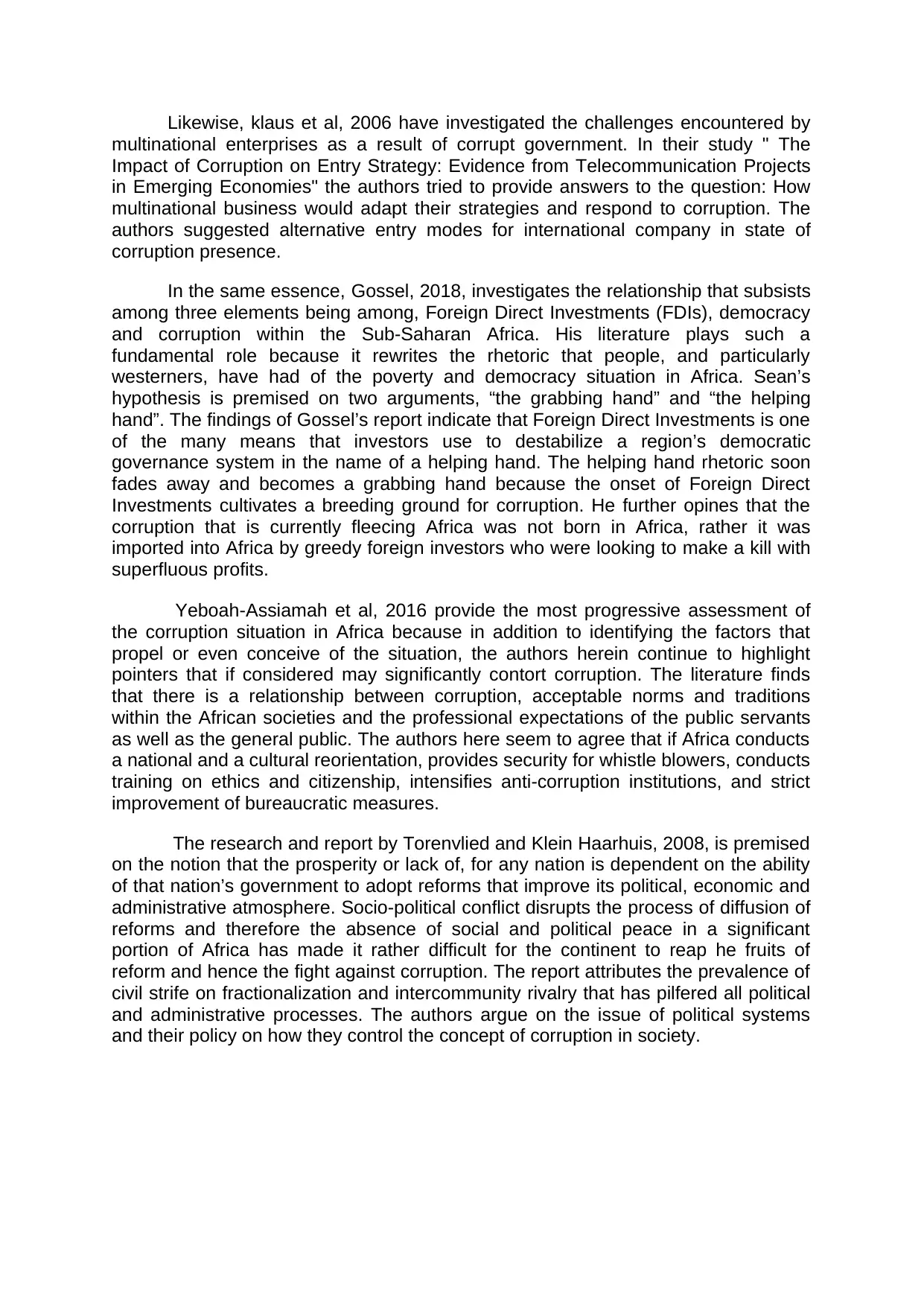
Likewise, klaus et al, 2006 have investigated the challenges encountered by
multinational enterprises as a result of corrupt government. In their study " The
Impact of Corruption on Entry Strategy: Evidence from Telecommunication Projects
in Emerging Economies" the authors tried to provide answers to the question: How
multinational business would adapt their strategies and respond to corruption. The
authors suggested alternative entry modes for international company in state of
corruption presence.
In the same essence, Gossel, 2018, investigates the relationship that subsists
among three elements being among, Foreign Direct Investments (FDIs), democracy
and corruption within the Sub-Saharan Africa. His literature plays such a
fundamental role because it rewrites the rhetoric that people, and particularly
westerners, have had of the poverty and democracy situation in Africa. Sean’s
hypothesis is premised on two arguments, “the grabbing hand” and “the helping
hand”. The findings of Gossel’s report indicate that Foreign Direct Investments is one
of the many means that investors use to destabilize a region’s democratic
governance system in the name of a helping hand. The helping hand rhetoric soon
fades away and becomes a grabbing hand because the onset of Foreign Direct
Investments cultivates a breeding ground for corruption. He further opines that the
corruption that is currently fleecing Africa was not born in Africa, rather it was
imported into Africa by greedy foreign investors who were looking to make a kill with
superfluous profits.
Yeboah‐Assiamah et al, 2016 provide the most progressive assessment of
the corruption situation in Africa because in addition to identifying the factors that
propel or even conceive of the situation, the authors herein continue to highlight
pointers that if considered may significantly contort corruption. The literature finds
that there is a relationship between corruption, acceptable norms and traditions
within the African societies and the professional expectations of the public servants
as well as the general public. The authors here seem to agree that if Africa conducts
a national and a cultural reorientation, provides security for whistle blowers, conducts
training on ethics and citizenship, intensifies anti-corruption institutions, and strict
improvement of bureaucratic measures.
The research and report by Torenvlied and Klein Haarhuis, 2008, is premised
on the notion that the prosperity or lack of, for any nation is dependent on the ability
of that nation’s government to adopt reforms that improve its political, economic and
administrative atmosphere. Socio-political conflict disrupts the process of diffusion of
reforms and therefore the absence of social and political peace in a significant
portion of Africa has made it rather difficult for the continent to reap he fruits of
reform and hence the fight against corruption. The report attributes the prevalence of
civil strife on fractionalization and intercommunity rivalry that has pilfered all political
and administrative processes. The authors argue on the issue of political systems
and their policy on how they control the concept of corruption in society.
multinational enterprises as a result of corrupt government. In their study " The
Impact of Corruption on Entry Strategy: Evidence from Telecommunication Projects
in Emerging Economies" the authors tried to provide answers to the question: How
multinational business would adapt their strategies and respond to corruption. The
authors suggested alternative entry modes for international company in state of
corruption presence.
In the same essence, Gossel, 2018, investigates the relationship that subsists
among three elements being among, Foreign Direct Investments (FDIs), democracy
and corruption within the Sub-Saharan Africa. His literature plays such a
fundamental role because it rewrites the rhetoric that people, and particularly
westerners, have had of the poverty and democracy situation in Africa. Sean’s
hypothesis is premised on two arguments, “the grabbing hand” and “the helping
hand”. The findings of Gossel’s report indicate that Foreign Direct Investments is one
of the many means that investors use to destabilize a region’s democratic
governance system in the name of a helping hand. The helping hand rhetoric soon
fades away and becomes a grabbing hand because the onset of Foreign Direct
Investments cultivates a breeding ground for corruption. He further opines that the
corruption that is currently fleecing Africa was not born in Africa, rather it was
imported into Africa by greedy foreign investors who were looking to make a kill with
superfluous profits.
Yeboah‐Assiamah et al, 2016 provide the most progressive assessment of
the corruption situation in Africa because in addition to identifying the factors that
propel or even conceive of the situation, the authors herein continue to highlight
pointers that if considered may significantly contort corruption. The literature finds
that there is a relationship between corruption, acceptable norms and traditions
within the African societies and the professional expectations of the public servants
as well as the general public. The authors here seem to agree that if Africa conducts
a national and a cultural reorientation, provides security for whistle blowers, conducts
training on ethics and citizenship, intensifies anti-corruption institutions, and strict
improvement of bureaucratic measures.
The research and report by Torenvlied and Klein Haarhuis, 2008, is premised
on the notion that the prosperity or lack of, for any nation is dependent on the ability
of that nation’s government to adopt reforms that improve its political, economic and
administrative atmosphere. Socio-political conflict disrupts the process of diffusion of
reforms and therefore the absence of social and political peace in a significant
portion of Africa has made it rather difficult for the continent to reap he fruits of
reform and hence the fight against corruption. The report attributes the prevalence of
civil strife on fractionalization and intercommunity rivalry that has pilfered all political
and administrative processes. The authors argue on the issue of political systems
and their policy on how they control the concept of corruption in society.
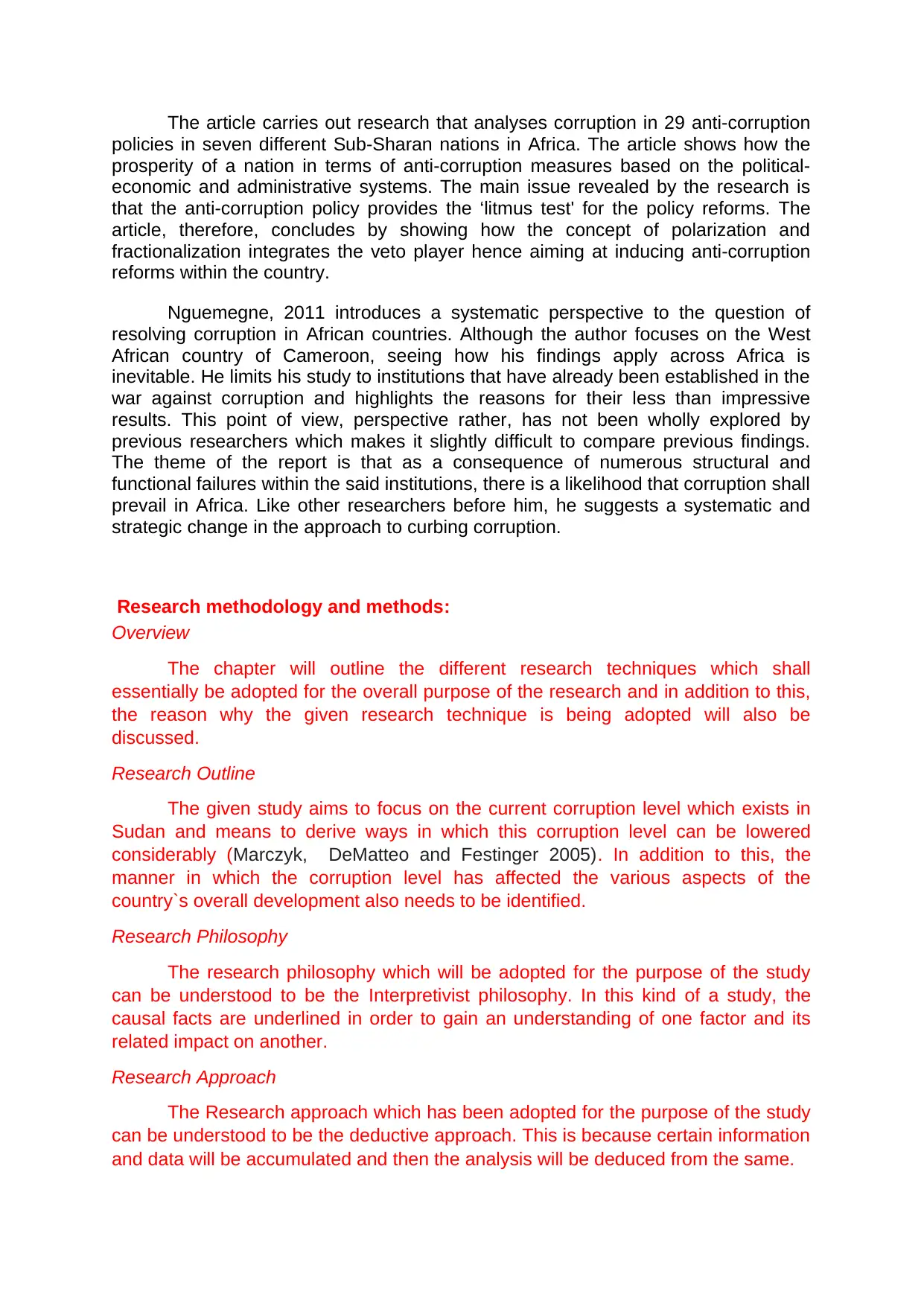
The article carries out research that analyses corruption in 29 anti-corruption
policies in seven different Sub-Sharan nations in Africa. The article shows how the
prosperity of a nation in terms of anti-corruption measures based on the political-
economic and administrative systems. The main issue revealed by the research is
that the anti-corruption policy provides the ‘litmus test' for the policy reforms. The
article, therefore, concludes by showing how the concept of polarization and
fractionalization integrates the veto player hence aiming at inducing anti-corruption
reforms within the country.
Nguemegne, 2011 introduces a systematic perspective to the question of
resolving corruption in African countries. Although the author focuses on the West
African country of Cameroon, seeing how his findings apply across Africa is
inevitable. He limits his study to institutions that have already been established in the
war against corruption and highlights the reasons for their less than impressive
results. This point of view, perspective rather, has not been wholly explored by
previous researchers which makes it slightly difficult to compare previous findings.
The theme of the report is that as a consequence of numerous structural and
functional failures within the said institutions, there is a likelihood that corruption shall
prevail in Africa. Like other researchers before him, he suggests a systematic and
strategic change in the approach to curbing corruption.
Research methodology and methods:
Overview
The chapter will outline the different research techniques which shall
essentially be adopted for the overall purpose of the research and in addition to this,
the reason why the given research technique is being adopted will also be
discussed.
Research Outline
The given study aims to focus on the current corruption level which exists in
Sudan and means to derive ways in which this corruption level can be lowered
considerably (Marczyk, DeMatteo and Festinger 2005). In addition to this, the
manner in which the corruption level has affected the various aspects of the
country`s overall development also needs to be identified.
Research Philosophy
The research philosophy which will be adopted for the purpose of the study
can be understood to be the Interpretivist philosophy. In this kind of a study, the
causal facts are underlined in order to gain an understanding of one factor and its
related impact on another.
Research Approach
The Research approach which has been adopted for the purpose of the study
can be understood to be the deductive approach. This is because certain information
and data will be accumulated and then the analysis will be deduced from the same.
policies in seven different Sub-Sharan nations in Africa. The article shows how the
prosperity of a nation in terms of anti-corruption measures based on the political-
economic and administrative systems. The main issue revealed by the research is
that the anti-corruption policy provides the ‘litmus test' for the policy reforms. The
article, therefore, concludes by showing how the concept of polarization and
fractionalization integrates the veto player hence aiming at inducing anti-corruption
reforms within the country.
Nguemegne, 2011 introduces a systematic perspective to the question of
resolving corruption in African countries. Although the author focuses on the West
African country of Cameroon, seeing how his findings apply across Africa is
inevitable. He limits his study to institutions that have already been established in the
war against corruption and highlights the reasons for their less than impressive
results. This point of view, perspective rather, has not been wholly explored by
previous researchers which makes it slightly difficult to compare previous findings.
The theme of the report is that as a consequence of numerous structural and
functional failures within the said institutions, there is a likelihood that corruption shall
prevail in Africa. Like other researchers before him, he suggests a systematic and
strategic change in the approach to curbing corruption.
Research methodology and methods:
Overview
The chapter will outline the different research techniques which shall
essentially be adopted for the overall purpose of the research and in addition to this,
the reason why the given research technique is being adopted will also be
discussed.
Research Outline
The given study aims to focus on the current corruption level which exists in
Sudan and means to derive ways in which this corruption level can be lowered
considerably (Marczyk, DeMatteo and Festinger 2005). In addition to this, the
manner in which the corruption level has affected the various aspects of the
country`s overall development also needs to be identified.
Research Philosophy
The research philosophy which will be adopted for the purpose of the study
can be understood to be the Interpretivist philosophy. In this kind of a study, the
causal facts are underlined in order to gain an understanding of one factor and its
related impact on another.
Research Approach
The Research approach which has been adopted for the purpose of the study
can be understood to be the deductive approach. This is because certain information
and data will be accumulated and then the analysis will be deduced from the same.
⊘ This is a preview!⊘
Do you want full access?
Subscribe today to unlock all pages.

Trusted by 1+ million students worldwide
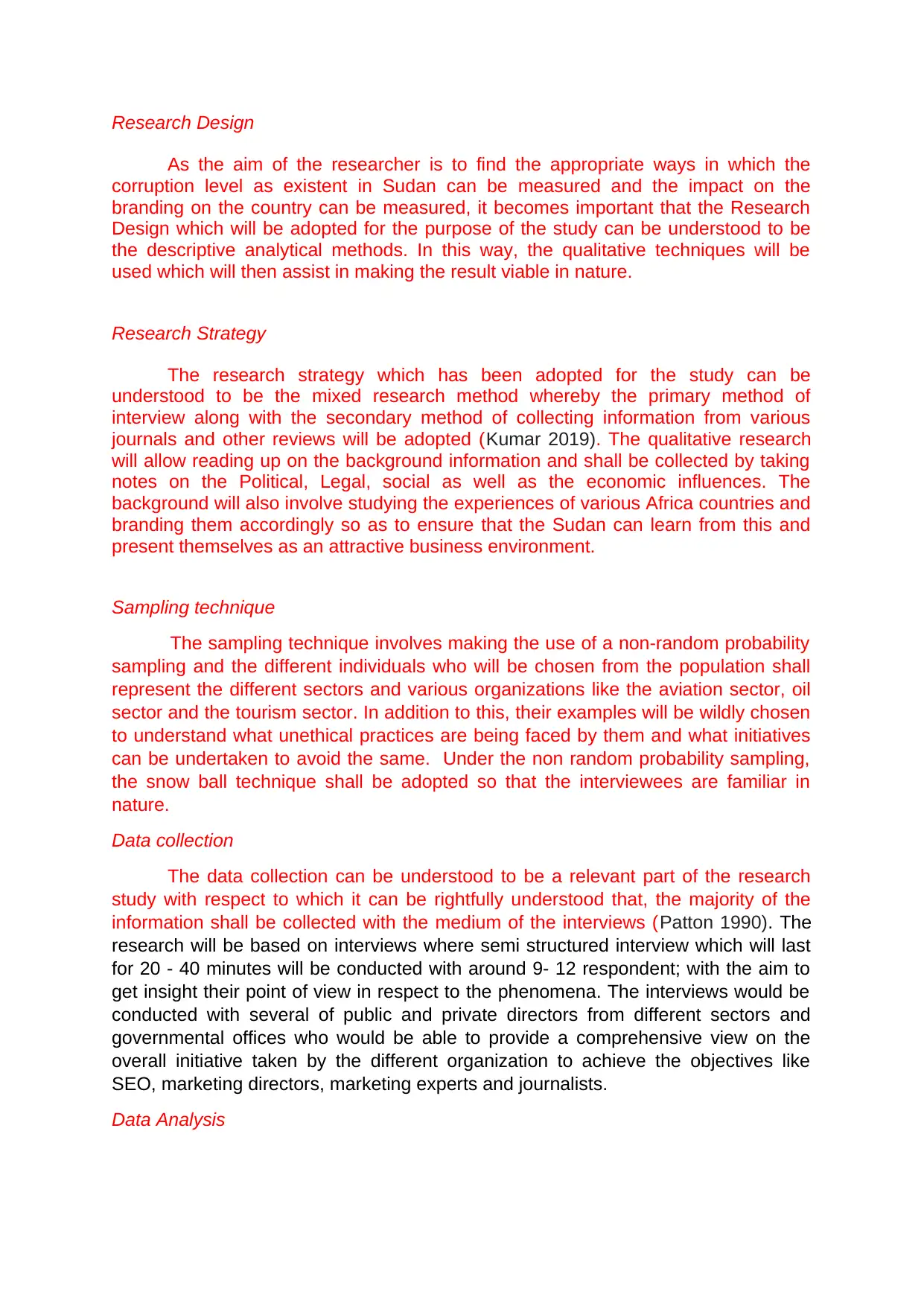
Research Design
As the aim of the researcher is to find the appropriate ways in which the
corruption level as existent in Sudan can be measured and the impact on the
branding on the country can be measured, it becomes important that the Research
Design which will be adopted for the purpose of the study can be understood to be
the descriptive analytical methods. In this way, the qualitative techniques will be
used which will then assist in making the result viable in nature.
Research Strategy
The research strategy which has been adopted for the study can be
understood to be the mixed research method whereby the primary method of
interview along with the secondary method of collecting information from various
journals and other reviews will be adopted (Kumar 2019). The qualitative research
will allow reading up on the background information and shall be collected by taking
notes on the Political, Legal, social as well as the economic influences. The
background will also involve studying the experiences of various Africa countries and
branding them accordingly so as to ensure that the Sudan can learn from this and
present themselves as an attractive business environment.
Sampling technique
The sampling technique involves making the use of a non-random probability
sampling and the different individuals who will be chosen from the population shall
represent the different sectors and various organizations like the aviation sector, oil
sector and the tourism sector. In addition to this, their examples will be wildly chosen
to understand what unethical practices are being faced by them and what initiatives
can be undertaken to avoid the same. Under the non random probability sampling,
the snow ball technique shall be adopted so that the interviewees are familiar in
nature.
Data collection
The data collection can be understood to be a relevant part of the research
study with respect to which it can be rightfully understood that, the majority of the
information shall be collected with the medium of the interviews (Patton 1990). The
research will be based on interviews where semi structured interview which will last
for 20 - 40 minutes will be conducted with around 9- 12 respondent; with the aim to
get insight their point of view in respect to the phenomena. The interviews would be
conducted with several of public and private directors from different sectors and
governmental offices who would be able to provide a comprehensive view on the
overall initiative taken by the different organization to achieve the objectives like
SEO, marketing directors, marketing experts and journalists.
Data Analysis
As the aim of the researcher is to find the appropriate ways in which the
corruption level as existent in Sudan can be measured and the impact on the
branding on the country can be measured, it becomes important that the Research
Design which will be adopted for the purpose of the study can be understood to be
the descriptive analytical methods. In this way, the qualitative techniques will be
used which will then assist in making the result viable in nature.
Research Strategy
The research strategy which has been adopted for the study can be
understood to be the mixed research method whereby the primary method of
interview along with the secondary method of collecting information from various
journals and other reviews will be adopted (Kumar 2019). The qualitative research
will allow reading up on the background information and shall be collected by taking
notes on the Political, Legal, social as well as the economic influences. The
background will also involve studying the experiences of various Africa countries and
branding them accordingly so as to ensure that the Sudan can learn from this and
present themselves as an attractive business environment.
Sampling technique
The sampling technique involves making the use of a non-random probability
sampling and the different individuals who will be chosen from the population shall
represent the different sectors and various organizations like the aviation sector, oil
sector and the tourism sector. In addition to this, their examples will be wildly chosen
to understand what unethical practices are being faced by them and what initiatives
can be undertaken to avoid the same. Under the non random probability sampling,
the snow ball technique shall be adopted so that the interviewees are familiar in
nature.
Data collection
The data collection can be understood to be a relevant part of the research
study with respect to which it can be rightfully understood that, the majority of the
information shall be collected with the medium of the interviews (Patton 1990). The
research will be based on interviews where semi structured interview which will last
for 20 - 40 minutes will be conducted with around 9- 12 respondent; with the aim to
get insight their point of view in respect to the phenomena. The interviews would be
conducted with several of public and private directors from different sectors and
governmental offices who would be able to provide a comprehensive view on the
overall initiative taken by the different organization to achieve the objectives like
SEO, marketing directors, marketing experts and journalists.
Data Analysis
Paraphrase This Document
Need a fresh take? Get an instant paraphrase of this document with our AI Paraphraser
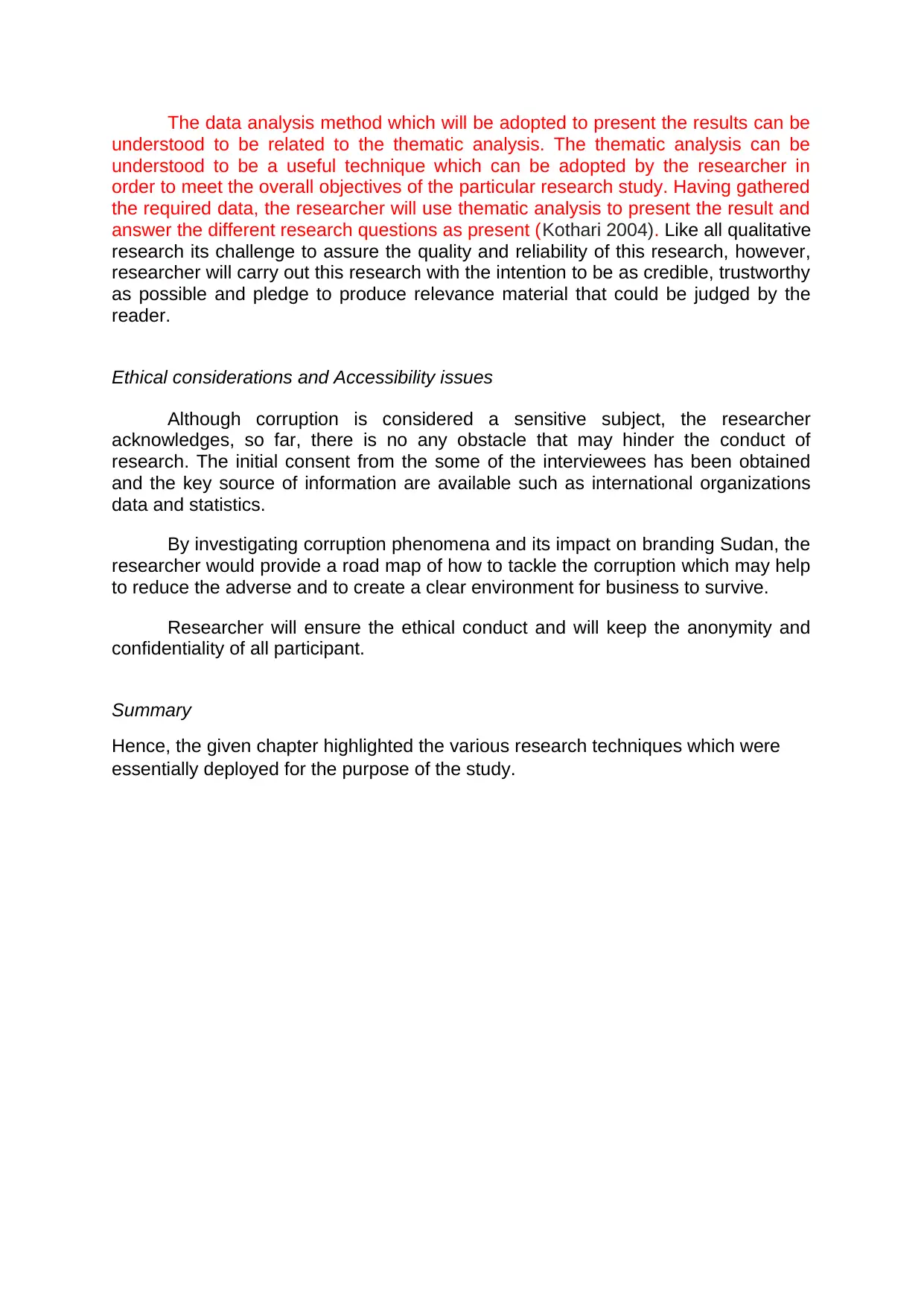
The data analysis method which will be adopted to present the results can be
understood to be related to the thematic analysis. The thematic analysis can be
understood to be a useful technique which can be adopted by the researcher in
order to meet the overall objectives of the particular research study. Having gathered
the required data, the researcher will use thematic analysis to present the result and
answer the different research questions as present (Kothari 2004). Like all qualitative
research its challenge to assure the quality and reliability of this research, however,
researcher will carry out this research with the intention to be as credible, trustworthy
as possible and pledge to produce relevance material that could be judged by the
reader.
Ethical considerations and Accessibility issues
Although corruption is considered a sensitive subject, the researcher
acknowledges, so far, there is no any obstacle that may hinder the conduct of
research. The initial consent from the some of the interviewees has been obtained
and the key source of information are available such as international organizations
data and statistics.
By investigating corruption phenomena and its impact on branding Sudan, the
researcher would provide a road map of how to tackle the corruption which may help
to reduce the adverse and to create a clear environment for business to survive.
Researcher will ensure the ethical conduct and will keep the anonymity and
confidentiality of all participant.
Summary
Hence, the given chapter highlighted the various research techniques which were
essentially deployed for the purpose of the study.
understood to be related to the thematic analysis. The thematic analysis can be
understood to be a useful technique which can be adopted by the researcher in
order to meet the overall objectives of the particular research study. Having gathered
the required data, the researcher will use thematic analysis to present the result and
answer the different research questions as present (Kothari 2004). Like all qualitative
research its challenge to assure the quality and reliability of this research, however,
researcher will carry out this research with the intention to be as credible, trustworthy
as possible and pledge to produce relevance material that could be judged by the
reader.
Ethical considerations and Accessibility issues
Although corruption is considered a sensitive subject, the researcher
acknowledges, so far, there is no any obstacle that may hinder the conduct of
research. The initial consent from the some of the interviewees has been obtained
and the key source of information are available such as international organizations
data and statistics.
By investigating corruption phenomena and its impact on branding Sudan, the
researcher would provide a road map of how to tackle the corruption which may help
to reduce the adverse and to create a clear environment for business to survive.
Researcher will ensure the ethical conduct and will keep the anonymity and
confidentiality of all participant.
Summary
Hence, the given chapter highlighted the various research techniques which were
essentially deployed for the purpose of the study.
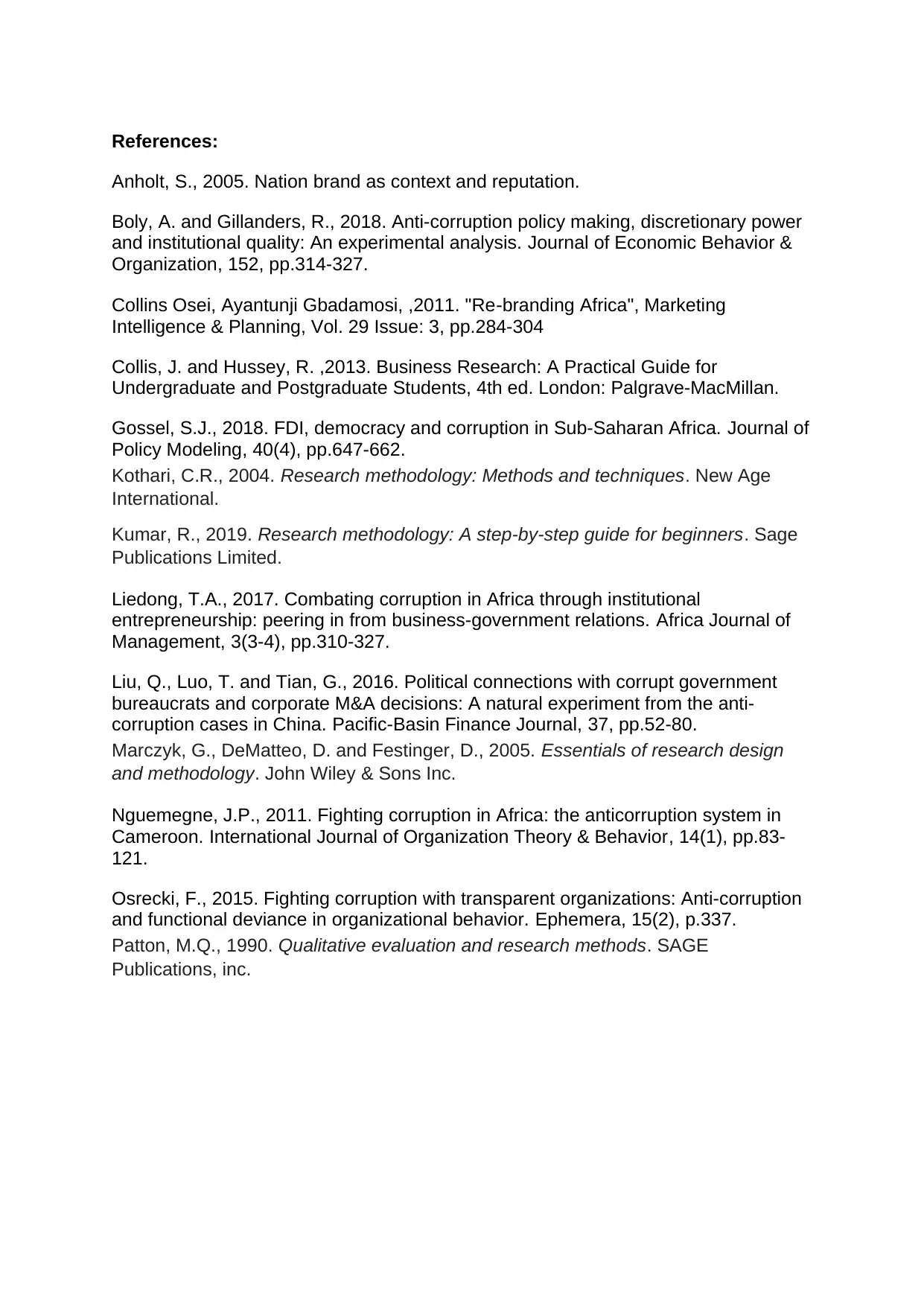
References:
Anholt, S., 2005. Nation brand as context and reputation.
Boly, A. and Gillanders, R., 2018. Anti-corruption policy making, discretionary power
and institutional quality: An experimental analysis. Journal of Economic Behavior &
Organization, 152, pp.314-327.
Collins Osei, Ayantunji Gbadamosi, ,2011. "Re‐branding Africa", Marketing
Intelligence & Planning, Vol. 29 Issue: 3, pp.284-304
Collis, J. and Hussey, R. ,2013. Business Research: A Practical Guide for
Undergraduate and Postgraduate Students, 4th ed. London: Palgrave-MacMillan.
Gossel, S.J., 2018. FDI, democracy and corruption in Sub-Saharan Africa. Journal of
Policy Modeling, 40(4), pp.647-662.
Kothari, C.R., 2004. Research methodology: Methods and techniques. New Age
International.
Kumar, R., 2019. Research methodology: A step-by-step guide for beginners. Sage
Publications Limited.
Liedong, T.A., 2017. Combating corruption in Africa through institutional
entrepreneurship: peering in from business-government relations. Africa Journal of
Management, 3(3-4), pp.310-327.
Liu, Q., Luo, T. and Tian, G., 2016. Political connections with corrupt government
bureaucrats and corporate M&A decisions: A natural experiment from the anti-
corruption cases in China. Pacific-Basin Finance Journal, 37, pp.52-80.
Marczyk, G., DeMatteo, D. and Festinger, D., 2005. Essentials of research design
and methodology. John Wiley & Sons Inc.
Nguemegne, J.P., 2011. Fighting corruption in Africa: the anticorruption system in
Cameroon. International Journal of Organization Theory & Behavior, 14(1), pp.83-
121.
Osrecki, F., 2015. Fighting corruption with transparent organizations: Anti-corruption
and functional deviance in organizational behavior. Ephemera, 15(2), p.337.
Patton, M.Q., 1990. Qualitative evaluation and research methods. SAGE
Publications, inc.
Anholt, S., 2005. Nation brand as context and reputation.
Boly, A. and Gillanders, R., 2018. Anti-corruption policy making, discretionary power
and institutional quality: An experimental analysis. Journal of Economic Behavior &
Organization, 152, pp.314-327.
Collins Osei, Ayantunji Gbadamosi, ,2011. "Re‐branding Africa", Marketing
Intelligence & Planning, Vol. 29 Issue: 3, pp.284-304
Collis, J. and Hussey, R. ,2013. Business Research: A Practical Guide for
Undergraduate and Postgraduate Students, 4th ed. London: Palgrave-MacMillan.
Gossel, S.J., 2018. FDI, democracy and corruption in Sub-Saharan Africa. Journal of
Policy Modeling, 40(4), pp.647-662.
Kothari, C.R., 2004. Research methodology: Methods and techniques. New Age
International.
Kumar, R., 2019. Research methodology: A step-by-step guide for beginners. Sage
Publications Limited.
Liedong, T.A., 2017. Combating corruption in Africa through institutional
entrepreneurship: peering in from business-government relations. Africa Journal of
Management, 3(3-4), pp.310-327.
Liu, Q., Luo, T. and Tian, G., 2016. Political connections with corrupt government
bureaucrats and corporate M&A decisions: A natural experiment from the anti-
corruption cases in China. Pacific-Basin Finance Journal, 37, pp.52-80.
Marczyk, G., DeMatteo, D. and Festinger, D., 2005. Essentials of research design
and methodology. John Wiley & Sons Inc.
Nguemegne, J.P., 2011. Fighting corruption in Africa: the anticorruption system in
Cameroon. International Journal of Organization Theory & Behavior, 14(1), pp.83-
121.
Osrecki, F., 2015. Fighting corruption with transparent organizations: Anti-corruption
and functional deviance in organizational behavior. Ephemera, 15(2), p.337.
Patton, M.Q., 1990. Qualitative evaluation and research methods. SAGE
Publications, inc.
⊘ This is a preview!⊘
Do you want full access?
Subscribe today to unlock all pages.

Trusted by 1+ million students worldwide
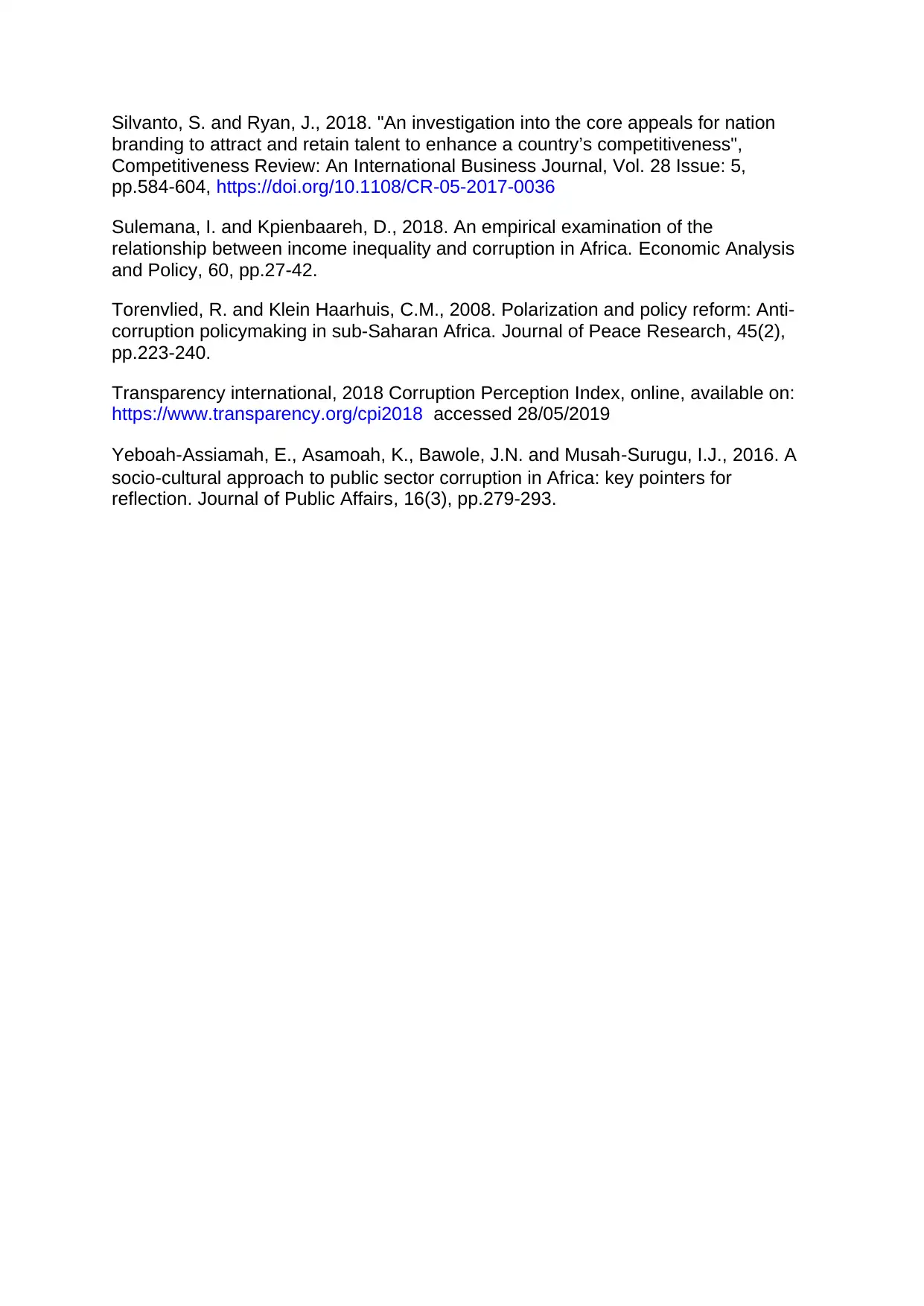
Silvanto, S. and Ryan, J., 2018. "An investigation into the core appeals for nation
branding to attract and retain talent to enhance a country’s competitiveness",
Competitiveness Review: An International Business Journal, Vol. 28 Issue: 5,
pp.584-604, https://doi.org/10.1108/CR-05-2017-0036
Sulemana, I. and Kpienbaareh, D., 2018. An empirical examination of the
relationship between income inequality and corruption in Africa. Economic Analysis
and Policy, 60, pp.27-42.
Torenvlied, R. and Klein Haarhuis, C.M., 2008. Polarization and policy reform: Anti-
corruption policymaking in sub-Saharan Africa. Journal of Peace Research, 45(2),
pp.223-240.
Transparency international, 2018 Corruption Perception Index, online, available on:
https://www.transparency.org/cpi2018 accessed 28/05/2019
Yeboah‐Assiamah, E., Asamoah, K., Bawole, J.N. and Musah‐Surugu, I.J., 2016. A
socio‐cultural approach to public sector corruption in Africa: key pointers for
reflection. Journal of Public Affairs, 16(3), pp.279-293.
branding to attract and retain talent to enhance a country’s competitiveness",
Competitiveness Review: An International Business Journal, Vol. 28 Issue: 5,
pp.584-604, https://doi.org/10.1108/CR-05-2017-0036
Sulemana, I. and Kpienbaareh, D., 2018. An empirical examination of the
relationship between income inequality and corruption in Africa. Economic Analysis
and Policy, 60, pp.27-42.
Torenvlied, R. and Klein Haarhuis, C.M., 2008. Polarization and policy reform: Anti-
corruption policymaking in sub-Saharan Africa. Journal of Peace Research, 45(2),
pp.223-240.
Transparency international, 2018 Corruption Perception Index, online, available on:
https://www.transparency.org/cpi2018 accessed 28/05/2019
Yeboah‐Assiamah, E., Asamoah, K., Bawole, J.N. and Musah‐Surugu, I.J., 2016. A
socio‐cultural approach to public sector corruption in Africa: key pointers for
reflection. Journal of Public Affairs, 16(3), pp.279-293.
1 out of 10
Related Documents
Your All-in-One AI-Powered Toolkit for Academic Success.
+13062052269
info@desklib.com
Available 24*7 on WhatsApp / Email
![[object Object]](/_next/static/media/star-bottom.7253800d.svg)
Unlock your academic potential
Copyright © 2020–2026 A2Z Services. All Rights Reserved. Developed and managed by ZUCOL.





